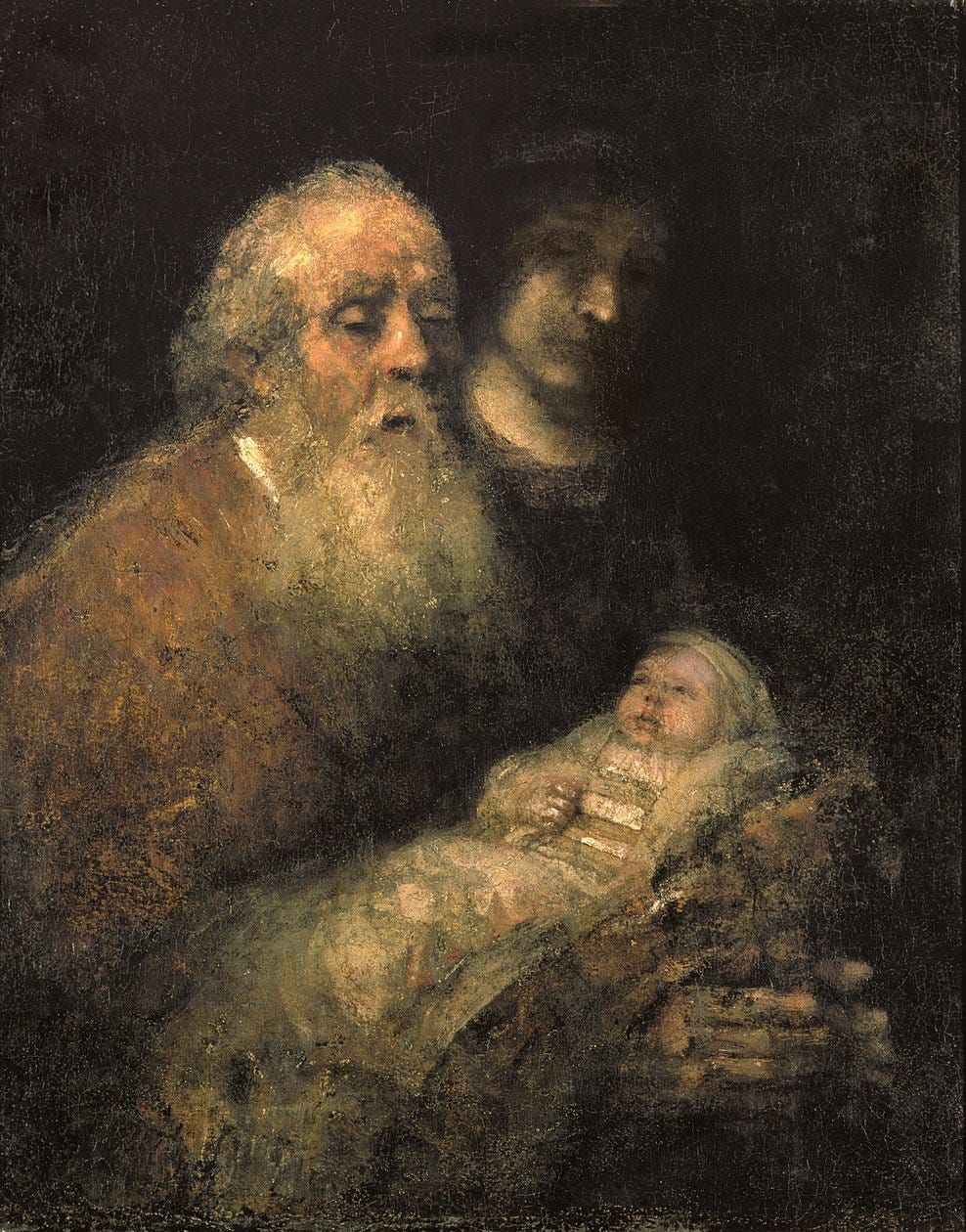Love Finds a Way
Homily for Sunday, February 2, 2025; the Solemnity of the Presentation of the Lord
Everybody loves a baby, right?
As I meditate on today’s Gospel reading I keep thinking about my mother-in-law’s residential care home, whenever her grandson brings the great-granddaughter in for a visit. All the residents crowd around to make a fuss over the baby. Just like Simeon and Anna, making a fuss over the Christ-child in the temple.
Everybody loves a baby.
The problem is that babies grow up. Any of us who have ever grumbled about “kids today” are all too aware that those babies grow up to have minds of their own. And they’re likely to make up those minds in ways we won’t always like, appreciate, or agree with.
In just a few months we will recall the story of Holy Week, when we will be reminded of the fact that this newborn Christ that Simeon and Anna greet today will grow up to be a very different kind of Messiah than anyone could have expected.
That’s fine for Simeon and Anna – they’re able to make their fuss over the infant, over the hope and promise that he represents, then turn him back over to his parents to do the hard part.
And that’s their job, to love not just the potential of the newborn but to continue to love the person he grows into. That’s what family does.
The second reading from Hebrews reminds us that we are part of that family. He became like his brothers and sisters, became like us, in every way, to draw us into that familial relationship. He’s with us for the long haul and wants us to be also.
Like Simeon and Anna we come to this temple today to encounter Christ – to encounter him here in the Word and here in the Eucharist. But what happens next? Do we leave him behind, here in the temple, and return to our lives? Or do we create a lasting relationship?
Our encounter with Christ here today in Word and Sacrament is a lot like an encounter with an infant. It asks nothing of us, or everything. It all depends on what we do next.
We can return the infant to his parents – return the Sacrament to the Tabernacle – and go about the rest of the week. Or we can nurture it, that faith planted in us by our encounter here. Let that faith within us grow and become strong, filled with wisdom and the favor of God.
That second option is of course the more rewarding and the more difficult. As our faith matures, like the infant, it develops in ways we never would have expected. Like a growing child, it requires us to love in ways we never thought we could.
As we grow and mature in our relationship to this Christ who became like his brothers and sisters in every way, we are challenged to learn how to love those same brothers and sisters. To love even when, especially when, it’s most difficult.
The movie Entertaining Angels, from the 1990s, tells the story of Catholic activist Dorothy Day. As a biography it leaves a lot to be desired but there is one scene that always gets me. At a low point in her difficult life, serving Jesus in the poorest and most desperate people of New York City during the depression, she prays to Jesus asking how she is supposed to find Him present in these people. You stink, she tells him; you vomit and wet your pants, how could anyone ever love you?
How indeed? The complaint is one that might be shared in moments of frustration by parents of newborns — or of caregivers looking after elderly or infirm loved ones. What they invariably find, what Day herself lived out, is that love adapts. Love finds a way.
That’s the challenge of our faith. That’s the challenge of loving a God who empties himself of his power and divinity to be born as an infant, to suffer and die a common criminal’s death, to serve rather than to be served. This is the living God we encounter here today, who calls us into active relationship with him – a relationship that grows and matures and changes our lives.
Because a faith that does not challenge us is stagnant. A religion that doesn’t nudge us out of our comfort zones every once in a while is useless. A relationship that doesn’t call us out of our own self-interest is only self-indulgence. Jesus wants more for us.
One of my favorite prayers is to ask the Lord to open my heart, that I can hear what He is trying to tell me that I don’t want to hear.
The fruit of this prayer unfolds gradually, helping me to put aside old ways and be more open to where God has been trying to lead me all along. It’s never come as a thunderbolt from the blue, but as the unfolding of an ongoing relationship. That is the kind of faith Jesus is calling us all into. A more mature relationship.
To be able to have the difficult conversations with Him. To hear the things we’d rather not hear. Like the quote from Dorothy Day – this one is not from the fictionalized movie version, but an actual quote from her writings: I really only love God as much as I love the person I love the least.
That’s a hard truth I continue to struggle with.


